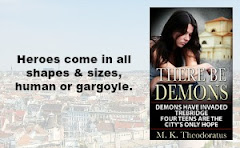Maybe I should lay on the guilt and ask: Did you accomplish anything over the holidays? I didn't even try -- though I did manage to finish a flash fiction piece for my critique group next week. On the other side of the coin, I can't find the short story I wrote in long-hand while my computer was down. -- Win some. Lose more.
Why didn't I accomplish much over the holidays? I took a trip to Tamora Pierce's Tortall. First, by reading Mastiff, the last book in the Beka Cooper trilogy. Then, I got the itch to read more and went on to an Alanna marathon: Alanna, In the Hand of the Goddess, The Woman Who Rides Like a Man, and Lioness Rampant. The first book is YA, and the quartet is more tween than YA.
It's no secret the books are well-written, so I won't blather about what makes them good other than saying Pierce has a deft hand with at her craft skills. I'll wish that you all a successful writing career as long as Tamora Pierce's instead.
So to pad this blog, I'll do a list of some of the things I especially liked about the books.
1) Liked the way Beka came off a failed "pairing" to land in the middle of a major uprising over taxes which resulted in her assignment to rescue the king's son.
2) Better yet, the result of her rescue of the crown prince of Tortall changed Tortall society forever.
3) The book contains lots enough plot twists and villains to keep the reader guessing.
4) In the Lioness books, liked how the two villains reappeared in the last book stronger and more evil than ever in the last book. Loved the way Pierce made their respective egos, the stumbling block to their success of their ambitions.
5) Also, liked the way she used the Cat Constellation as a tie-in between the two series.
If I had the time, I'd read the Pierce's Trickster books which center on Alanna and George's daughter,. but I need to de-emphasize my reading after I read a book for New Year's. After that, I need to write more and social network less.
Why didn't I accomplish much over the holidays? I took a trip to Tamora Pierce's Tortall. First, by reading Mastiff, the last book in the Beka Cooper trilogy. Then, I got the itch to read more and went on to an Alanna marathon: Alanna, In the Hand of the Goddess, The Woman Who Rides Like a Man, and Lioness Rampant. The first book is YA, and the quartet is more tween than YA.
It's no secret the books are well-written, so I won't blather about what makes them good other than saying Pierce has a deft hand with at her craft skills. I'll wish that you all a successful writing career as long as Tamora Pierce's instead.
So to pad this blog, I'll do a list of some of the things I especially liked about the books.
1) Liked the way Beka came off a failed "pairing" to land in the middle of a major uprising over taxes which resulted in her assignment to rescue the king's son.
2) Better yet, the result of her rescue of the crown prince of Tortall changed Tortall society forever.
3) The book contains lots enough plot twists and villains to keep the reader guessing.
4) In the Lioness books, liked how the two villains reappeared in the last book stronger and more evil than ever in the last book. Loved the way Pierce made their respective egos, the stumbling block to their success of their ambitions.
5) Also, liked the way she used the Cat Constellation as a tie-in between the two series.
If I had the time, I'd read the Pierce's Trickster books which center on Alanna and George's daughter,. but I need to de-emphasize my reading after I read a book for New Year's. After that, I need to write more and social network less.
Yeah, 'Tis the Season for Lists:
I'm sticking to adding things to my to-do list. Maybe this should be on yours too. -- The book is published in whichever medium, including sideways. Now it's time for book reviews. I've been fortunate to get a few, but you can never get enough good book reviews. Novel Publicity & Co ran an article on increasing your chances of getting a review. Whether the review's good or not, depends on whether you wrote a good book.
Have you written a list of best books, leading men, or what? Sure seems to be a lot of lists on the e-newsletters I subscribe to.



